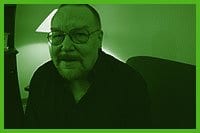“The bottom line is that we don’t get good service from the healthcare system,” says Gens Hellquist, executive director of the Canadian Rainbow Health Coalition.
But that’s something Hellquist is out to change, and his group’s just been given $2.3-million by Health Canada to do it.
The Canadian Rainbow Health Coalition is a collection of groups and individuals from across the country that are interested in addressing health and wellness issues for queer people. Formed at a gay and lesbian health services conference in Saskatoon in 2001, the coalition secured the funding for its first major project last month. Its 15-member board of directors met last week in Toronto to decide how it will use the money.
Operating out of an office in the same building as the Gay And Lesbian Health Services in Saskatoon, the first task of the coalition’s four newly hired permanent staff members will be to bring queer health issues into Canada’s medical schools.
“The purpose of this project is to go after medical colleges, nursing colleges, schools of social work and work with them to develop and institute curriculum so that graduating students have a clear sense of what our issues are, how to work on those issues and how to provide us with quality non-homophobic services,” says Hellquist.
Though HIV/AIDS has often received the lion’s share of attention and funding, Hellquist says there are many other health issues that queer people face in greater proportion to other Canadians.
“Suicide rates, substance abuse rates, mental illness rates,” says Hellquist. “To this point we tend to be seen as a community whose only health issue is AIDS, when actually there are more people in our community who die from suicides or who die from substance abuse.”
Even with HIV/AIDS, Hellquist says the healthcare system’s efforts fall short, failing to take into account the real-life situtations of queer people.
“In the past, we have often taken one-note programs like, ‘Use a condom and everything will be fine,'” says Hellquist. “What we are recognizing is that we are complex human beings and we need to be dealt with as complex human beings. To just say ‘use a condom’ may not work with somebody who has low self-esteem or with someone who has substance abuse problems.”
If the healthcare system has difficulties serving lesbian, gay, bi and trans people, things only get worse for queer people who belong to racial and ethnic minorities. So the coalition is also working on developing a national network of community-based queer groups. As that network develops, groups, such as two-spirited First Nations peo-ple, will be partnered with local health organizations.
“This is the first time in Canada that we are able to get together as gay and lesbian health service providers to identify and address these issues, to work on a plan together,” says Art Zoccole, exe-cutive director of Two-Spirited People Of The First Nation and a founding member of the coalition.
Zoccole says there needs to be more of an exchange between mainstream health providers and other approaches.
“The aboriginal community uses and utilizes traditional healers, medicine people, elders, councillors and others to help us out in the mental health area,” says Zoccole. “When you deal with aboriginal mental health issues, then, the missing link is the lack of knowledge from healthcare professionals about the issues that are faced by aboriginal two-spirited people.”
Zoccole says he will work with the coalition to identify those issues and bring them to the attention of the medical community.
The Canadian Rainbow Health Coalition board of directors includes four members from Ontario: Zoccole, Tony Caines from Toronto Public Heath, Barry Deeprose from Pink Triangle Services in Ottawa and Nick Mulé from the Coalition For Lesbian And Gay Rights In Ont-ario (CLGRO). Women on the board include Lori Crozier from Whitehorse and Donna Huen from Winnipeg.
Mulé says Ontario is in better shape than other jurisdictions because there is already some established queer healthcare groups and projects here.
“It is exciting that we are addressing [queer health] from that national perspective,” says Mulé. “I can’t say that every province or territory in the country is quite set up the way we are in Ontario.
“You’ve got CLGRO at the provincial level,” he says. “You’ve got the Rainbow Health Network [a Toronto-based group of more than 80 health services workers] at a local level… and now the Canadian Rainbow Health Coalition at a national level. So we are all kind of plugged in.”
Hellquist is careful to stress that the project is still in the development stages, but says that the goal is to address the queer community’s health concerns in the broadest possible sense.
“In the past what’s happened is that gay men’s issues have been dealt with to the exclusion of lesbians or bisexuals or transgendered people. We see this as a project working on the issues for all people.”

 Why you can trust Xtra
Why you can trust Xtra


